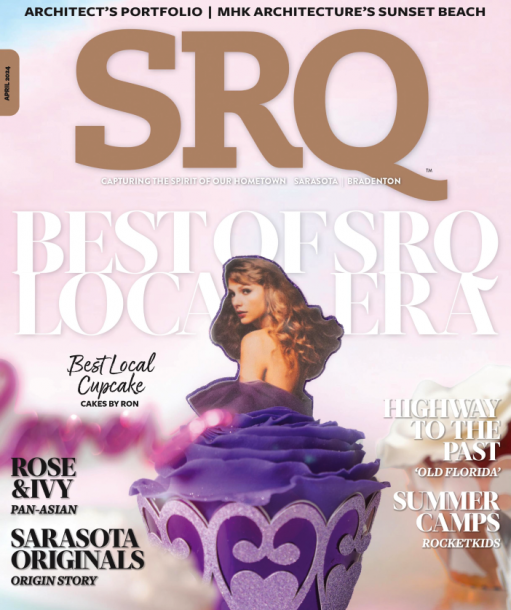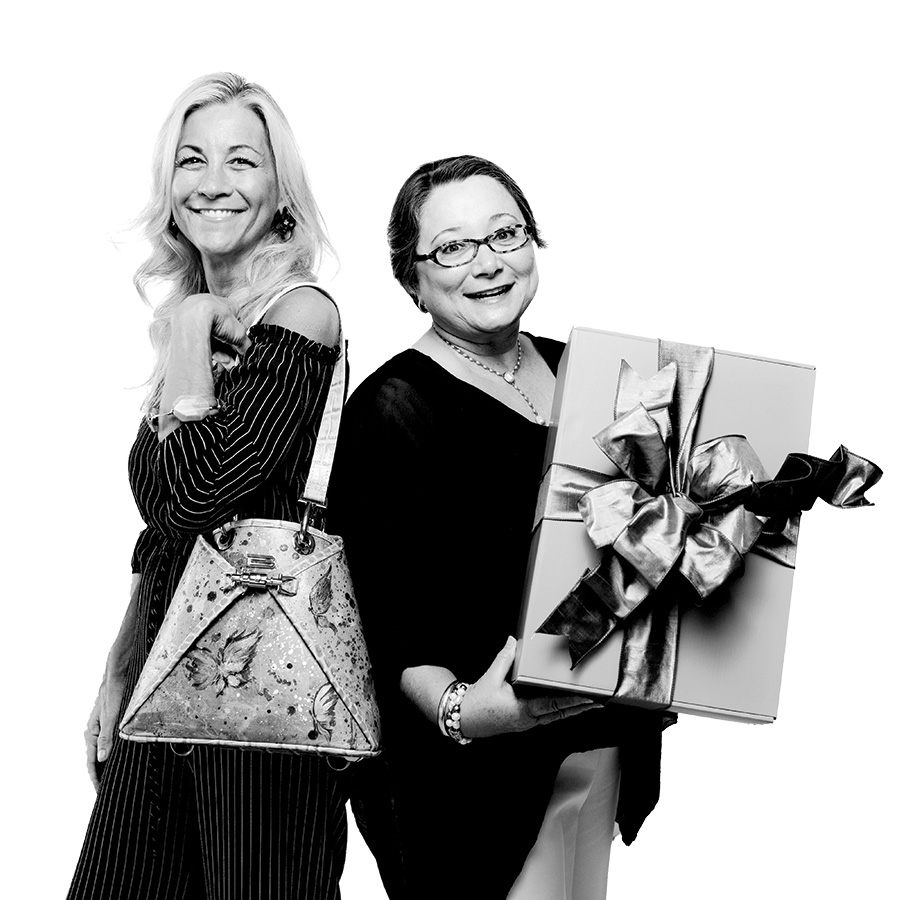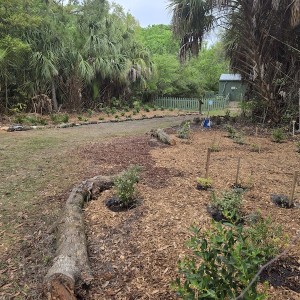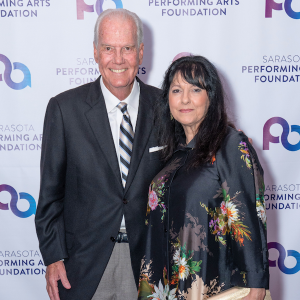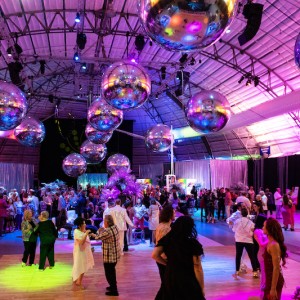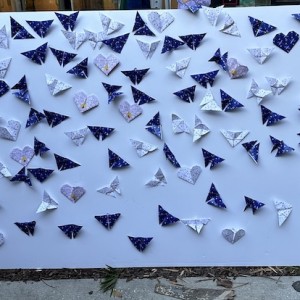We’ve all heard of giving butterfly kisses, and while they are an adorably affectionate gesture, local handbag atelier BSWANKY used less fluttering of its eyelashes and more stitching of its needles to design a special butterfly-themed bag. In a moving fashion–philanthropy collab, a luxury handbag collection was designed and created with proceeds going toward funding the regional Tidewell Foundation’s Blue Butterfly Family Grief Centers. The nonprofit mission of Tidewell Hospice partnered with founder and designer of BSWANKY Gretchen Bauer to further fund its services to grieving individuals with professional counseling, peer-support groups and therapeutic activities to help them along on their journey to coping and healing. Therapy and bereavement services are completely donor-supported and available at no cost to community members, in addition to Tidewell Hospice patients and their families. “Blue Butterfly offers a safe and caring environment for children, teens and caregivers to connect with others and grieve in a way that makes them feel supported,” says Tidewell Hospice President and CEO Jonathan Fleece.
Since launching the give-back handbag collection, Sofita Mariposa (“mariposa” translates to butterfly in Spanish), in August 2020, 15 percent of the total sale of each bag, and 100 percent of Sapphire Mariposa BSWANKY keychain sales, have been donated to Blue Butterfly Family Grief Centers to encourage mourning individuals to “carry” on. “We hope that the sale of these limited-edition luxury handbags can help women and children alike to spread their wings,” says Bauer. Inspired by the personal stories of children and families who are a part of the program, the designer shared the common belief that no child should ever grieve a lost loved one alone. The Sofita Mariposa handbag features honey-colored heritage leather, signature metal embellishments and is entirely handcrafted in Sarasota, then hand-painted and sealed with ethereal butterflies by Dallas-based artist Cherie Fruehan. A dear friend of Bauer, Fruehan donated her services to hand-paint each one-of-a-kind, luxury bag. Much like its namesake, the Mariposa collection was made to symbolize the beauty of life and the flutter of hope—truly making this fashion accessory an emotive, meaningful piece of art.
“We had a customer who emailed us because his wife loved the BSWANKY Blue Butterfly Handbag image she had seen online and he requested to purchase it for her,” explains Bauer. When this very gentleman came in to pick up his gift-wrapped one-of-a-kind, hand-painted handbag, Bauer told him about their giving back program with Tidewell Foundation’s Blue Butterfly Family Grief Centers. It seemed fate. The gentleman shared that he and his wife had lost one of their children recently in an accident and that he had never heard of the organization. “He fought back tears and let us know that this gift could not wait until Christmas and that he would be gifting it to her immediately.” SRQ —Brittany Mattie
You can give a virtual butterfly kiss to someone in need of a smile by purchasing the chic shoulder bag to help the cause at bswanky.com/products/sofita-mariposa.
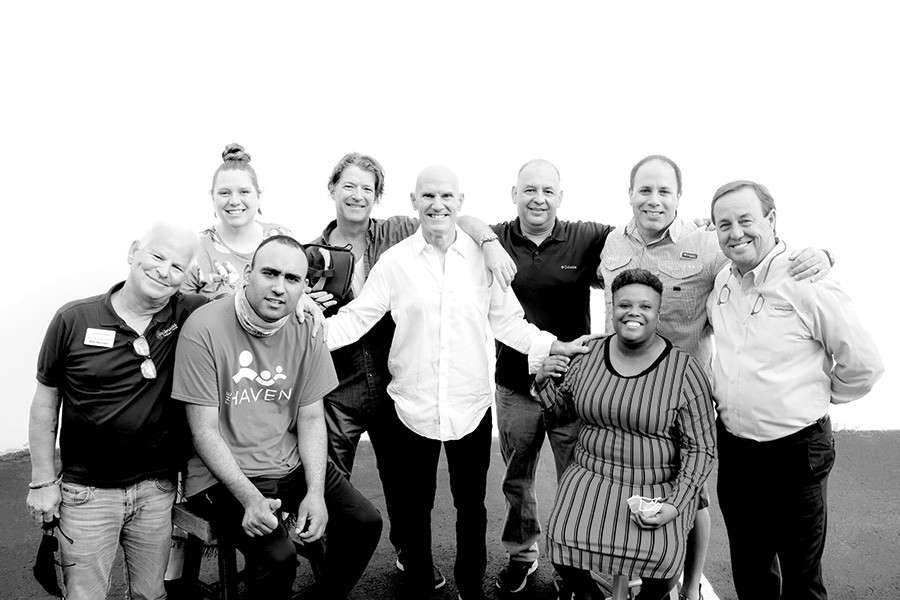
Have Purpose, Will Profit
Beaver Shriver was standing inside the commercial space on State Street where his new business venture, Rise Coffee Co. & Nye’s Cream Sandwiches, would soon operate when in walked a young man and his mother to inquire about a job. Shriver remembers he showed them around the space, pointing out where the coffee equipment would go, how the ice cream machines would work and his general vision for the operation. “The guy was really quiet and polite the whole time,” says Shriver, “but when they left and thought they were out of earshot, I heard him go ‘woo-hoo!’” The young man had every reason to be excited at even the prospect of a job; he has autism spectrum disorder (ASD), and 80 percent of people with that diagnosis are unemployed. Shriver thinks that number is unacceptable. And he aims to change it.
Rise Coffee Co. & Nye’s Cream Sandwiches was founded specifically to employ the broad array of neurodivergent individuals who for too long have been viewed as unemployable. Shriver himself comes from a long line of champions for those with ASD, beginning with his aunt and founder of the Special Olympics, Eunice Kennedy Shriver, as well as his cousin Anthony, founder of Best Buddies International, an organization that seeks to increase awareness and inclusion for those with ASD. But one of the biggest challenges in hiring employees with special needs is job training. To that end, Shriver strung together a web of nonprofit and for-profit outfits who could commit their resources and energy to his vision.
The first one is EasterSeals Southwest Florida. “We’ve got leading-edge training for individuals with autism and other disabilities,” says Tom Waters, president and CEO. The nonprofit offers an extensive menu of services, job training among them. Through its extensive network of funding streams, EasterSeals managed to secure a state grant specifically to expand their job training offerings. With that grant, Waters and Shriver enlisted the other player in this endeavor, Three Six and Zero, Inc., a virtual reality (VR) design firm based in Sarasota.
“We met Beaver at a Ringling College event and he told us about his business,” says Alex Guerra, executive producer for Three Six and Zero. Along with business partner Tim Conway, the two started their design outfit to transition out of their Hollywood careers as visual effects designers and into something that satisfied their need to do good. Guerra and Conway had already found their niche in health and wellness with contracts from Moffitt Cancer Center and Sharecare, the medical platform started by Dr. Mehmet Oz and Jeff Arnold (founder of WebMD). Between their rapport with Shriver, their portfolio and their desire to be a part of something good, Guerra and Conway formed the third part of this social enterprise.
The three pieces then set out to collaborate on immersive virtual reality training modules for the coffee shop. “For the first four or five months, we developed the coffee grinder module,” says Guerra. In it, candidates already working with EasterSeals could try out the module, which featured a VR version of the actual Bunn grinder used in Shriver’s coffee shop. “We were able to collaborate with the specialists to draw data analytics,” says Guerra, “and that helped us understand what was working and what was not.” Later versions of the module added the ability to up the stakes with the emotional and social components of the task like irate customers. “VR is a remarkable way to get somebody comfortable with a task,” says Shriver, “especially someone who may have learning issues.”
Each piece of this collaboration has high hopes for the project. “To my knowledge, there has never been anything like this where the job training is so specific,” says Waters. It bodes well for EasterSeals’ ability to place its clients in jobs, but the implications are much larger. “This is about giving dignity and pride to a population that has been kept in the shadows for too long,” says Shriver, “and I think the future of business should be more mission-oriented.” SRQ —Andrew Fabian
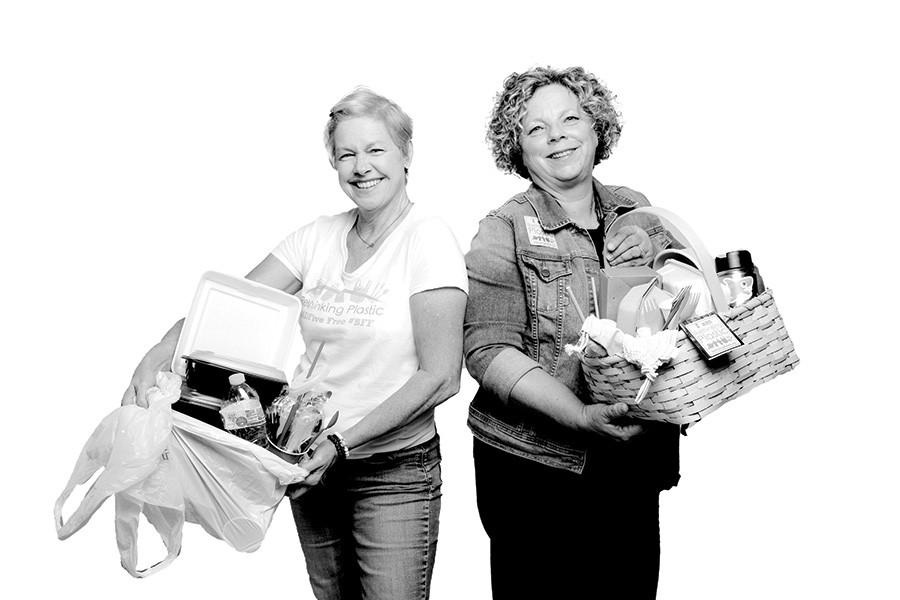
Zero-Waste Voyagers
“Recycling is not enough.” That’s a mantra Rethinking Plastic lives and breathes by. The volunteer-driven campaign has been connecting with restaurants and consumers throughout Sarasota County since 2017 on the hot-button issue of eliminating single-use plastics, and thus protecting our coastal land, ocean and marine life. “There is a huge learning curve when it comes to single-use plastic and its alternatives,” say Rethinking Plastic founders Cat Dillard and Jana Hoefling.
The organization’s team of volunteers donates its time to guide restaurants both in the dining-in and to-go transition to reduce excess packaging in their daily operations by converting to eco-smart resources. With a hyper-focus on items they refer to as the “bad five”—clamshell polystyrene takeout containers, plastic cups/lids/straws, plastic bottles, plastic bags and plastic utensils—the BadFive Free (BFF) program works with businesses to source and utilize more eco-minded solutions to combat their carbon waste footprint. “As a community, we can begin to make an immediate and substantial impact on plastic pollution by refusing these single-use items, and begin to use alternatives and reusables,” say Dillard and Hoefling. The applaudable BadFive Free stamp celebrates local restaurants that refuse single-use plastic. When a restaurant obtains “BFF” recognition, they’ve successfully figured out how to provide patrons with options to mitigate each individuals’ waste footprint.
Among the local dining spots taking advantage of Rethinking Plastic’s services is Leaf & Lentil. The family-owned, fast-casual vegan eatery signed on early to become #BFF compliant—having completed all five stars by working closely with Dillard and Hoefling. By only using plant-based/paper to-go packaging and offering cooler drinks that are in glass or aluminum containers, Leaf & Lentil eliminated all single-use plastic serveware and materials within its operations. “Finding alternatives to plastic has been harder than I ever expected but worth the effort,” says Sheila Siegel, co-owner of Leaf & Lentil. “We’ve especially struggled with product availability a bit during this pandemic, but watching The Story of Plastic documentary and being a part of Rethinking Plastic’s coalition has committed us to trying that much harder.” Indigenous and Blu Kouzina are among other restaurants taking the pledge. Sarasota Sailing Squadron is close to gaining its fifth star for its on-site social events, while MADE and the former 1812 Osprey made are working toward eco-alternatives for three of the BadFive.
“Because single-use plastics are not going away anytime soon, we have recently started to research two methods of eliminating it that are gaining traction around the world,” Dillard and Hoefling say. “EPR and incineration.” EPR (Extended Producer Responsibility) legislation is being used across the country for items like car batteries, paint, mattresses, etc. This method shifts the responsibility of the end of an article’s life from the consumer to the manufacturer. “During the time of quarantine and the popularity of take-out food, the amount of single-use plastic has skyrocketed,” they say. “Restaurants are struggling to survive and the environment has suffered. While we understand the dilemma, we hope to get back on track soon.” SRQ —Brittany Mattie
Any local establishment or business can get on board with the cause by reaching out to info@rethinkingplastic.org. Those that have already committed to reducing single-use plastics in their businesses can sign a pledge on rethinkingplastic.org.
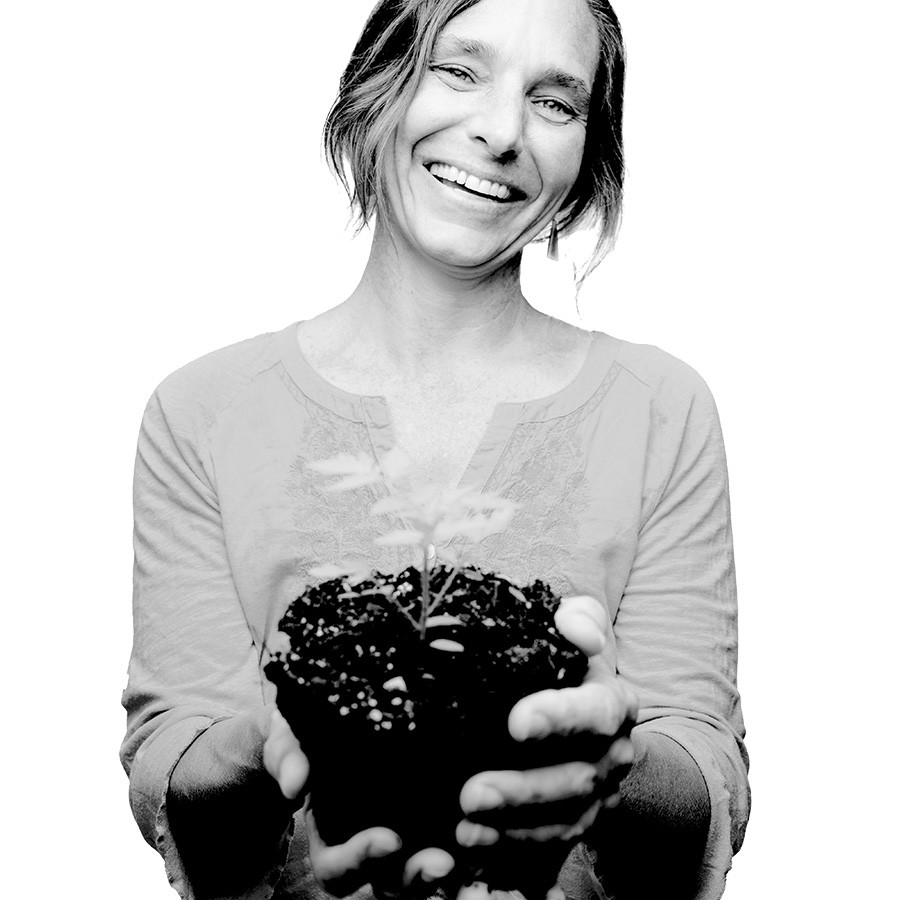
Pitchfork Basis
From morning floss to worn-out jeans, potato chip bags to paper towels, sugar packets, pencil shavings, grocery receipts and lunch leftovers, you will generate roughly 4.51 pounds of waste per day. But we all know what they say about one man’s trash . . . and that’s where Sunshine Community Compost comes in, a local nonprofit not only spreading the word but supplying the tools to reduce our communal waste. As it turns out, approximately 50 percent of typical municipal garbage can be reallocated through composting, the biological decay of organic matter that turns yesterday’s waste to tomorrow’s rejuvenated soil. Grains, pastas, breads, eggshells, coffees, teas, paper towels, napkins, cardboard rolls, and all fruit and veggie scraps—their meaningful destiny awaits and it’s not on the curb.
The compost conversation, however, begins not with worms or fruit flies, food scraps or soil, but rather a simple acknowledgment: the privilege of having food. “We hope people will take the responsibility to do the right thing,” says Tracie Troxler, executive director and the sole staff member. And in just three short years, aiding that mission statement with a collective of programs available for the everyday waste creator and sustainable soul, Sunshine Community Compost has diverted 44,000 pounds from local landfills. That’s the equivalent of roughly 2,200 watermelons or 14 Prii, “basically on a pitchfork by pitchfork basis,” she says.
After beginning her career as an occupational therapist, Tracie Troxler realized an urge to bring her patients and their communities outdoors, merging people and the planet for the wellness of both. And after 17 years in California, building a network and community of agriculture enthusiasts, farmers and environmentalists, the daunting nature of food waste presented a treatable crisis when Tracie returned home to Florida. What started as a mix of pilot projects has flourished into a nonprofit with a team of 30 volunteers, four board members and more than 500 active composters in the Sarasota area and growing. Programs target community engagement and resource recovery, but most of all, an investment in the education of the waste generation. “So much of what we’re viewing in a limited way as waste is truly a resource that just isn’t put in the right place and can be something that regenerates life, connections and community,” says Troxler.
Nothing embodies their mission more than the signature Park and Garden Community Compost program. The process? Simple. The benefits? Evident. The smell? Not as bad as you might expect. With composting stations at Arlington and Gillespie Parks, North Water Tower Park and Manatee Square Garden, the seemingly overwhelming process of earning a “Composter” badge of honor has emerged as a communal effort within shared spaces. After choosing a convenient composting site—and picking up a complimentary red Ace Hardware bucket to temporarily house your food scraps at home—the process is quite simple. Proudly bring your bucket to your designated park and composting location, weigh and log your deposit for tracking purposes, dump your food scraps into an active compost bin, cover the deposit with pre-collected browns (twigs, leaves, etc.), then seal and feel sustainably energized. Food scraps and everyday materials often thrown in the trash can now contribute to compost missions, transforming would-be waste into regenerated soil for the community’s future use. There’s no cost to you, just an invitation.
“We want there to be many pods of this kind of work that is attuned to that local culture and local community,” says Troxler. By staying small and rooted in the local scene, not only can composting projects be customized to fit the needs of various communities—whether that be neighborhood associations, farmers markets, schools, businesses or even isolated events like weddings and parties—there is a freedom to experiment and dive into the unknown fearlessly. “Any work I’m going to do is going to be a co-creative process,” says Troxler. “When you start planting those seeds of ideas, people start showing up.” SRQ —Olivia Liang
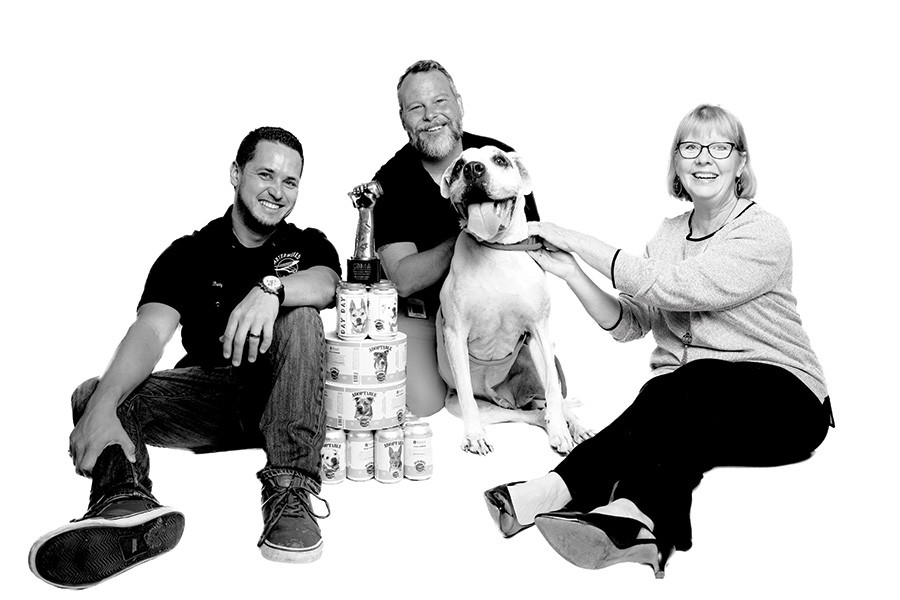
Drink Up for the Pups
As manager Barry Elwonger simply put it, “People love dogs and people love beer.” It’s hard to more perfectly sum up the success of Motorworks Adoptable Lager than that. An idea borne from a previous philanthropic can of breast cancer awareness beers, the dog-friendly brewery decided to put their nonprofit directly into people’s hands with monthly runs of beer featuring the adorable faces of dogs waiting to be adopted. “We’re just big dog people over here. We have ‘yappy hour,’ we have a dog-friendly beer garden. Almost all our staff owns a dog. It’s just something that speaks to who we are,” says Elwonger. The lagers that launched at the bar in January, have been a woofing success. The support from the community has been “overwhelming,” and to date every dog who was afforded their 15 minutes of fame on a can in a hand has been adopted.
Barry also says the local shelters they work with have seen a significant change threefold: in funding, in the interest in adoptions and, most importantly, in the amount of dogs leaving for their fur-ever homes. In collaboration with Pam Freni of Animal Network, Motorworks partnered with the 20-year-old philanthropy effort to help support the Animal Network’s Shelter Manatee Capital Campaign, a long name hoping to shorten the stay of animals in shelters by building a new one in Manatee County. She says, “Working with Motorworks has been an amazing opportunity for us and really emphasizes the synergy that can happen when a nonprofit and a local business come together for the good of the community.”
Perhaps the most heart-warming story, one that sounds like it was written for a Lifetime movie, evolved from the original four-pack of dogs featured. A woman in Minnesota, of all places, spotted a familiar face that she believed to be her dog that had been missing for years. Incredibly, they were able to verify through the microchip that the dog made famous on Adoptable Lager was in fact her long-lost pup who had trekked all the way down to Florida. In a true act of compassion, one of the shelter workers drove the dog all the way back to Minnesota to be reunited with its overjoyed owner.
The quirky cans have proved a raging success even for long-term shelter residents. The newest run of cans saw a doggo with two years under his belt at the shelter adopted within a week. And it’s not just Sarasota taking notice. People magazine and even The Ellen DeGeneres Show picked up this local story. Putting out new dogs roughly every month, Motorworks Brewing has made it easy to look for your newest pet. Just grab a beer. SRQ —Ariel Chates
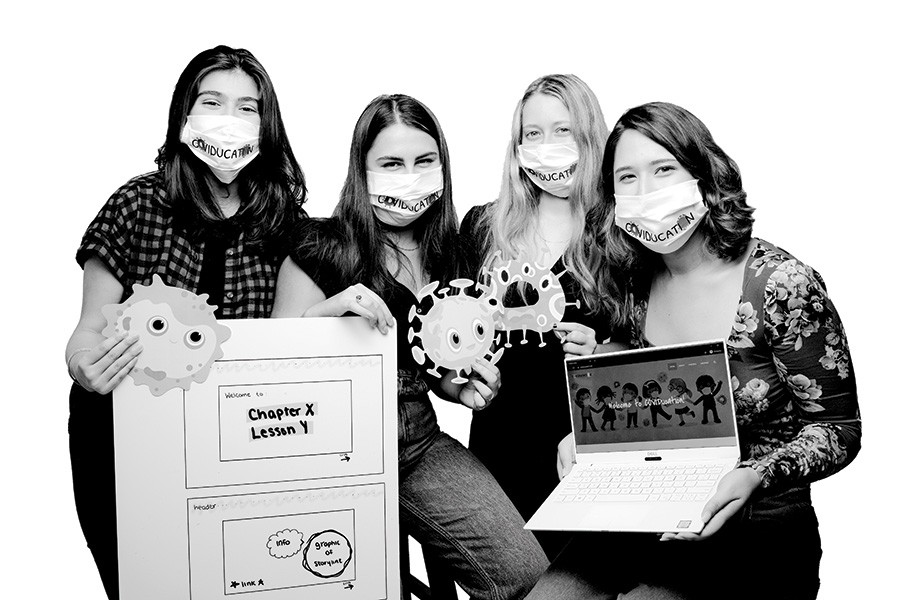
CARTOON-IFYING COVID
It’s the first day of third grade. Students try on their new Spiderman backpack, jumping up and down to test out their new light-up sneakers, and distractedly listen to their grown-up run through a list of things not to forget. Items they’ve always brought to school like a lunch box, gym clothes and an afternoon snack. But then, some new items like a mask and hand sanitizer and maybe even a face shield. For others, the start of the new school year began in their living room. Kindergarten taught on a comfy couch while looking at 20 little squares with new faces and friends. Adults are all doing their best to navigate and understand the complexities of this “new normal.” Imagine how confusing it might be for little ones who can’t read the newspaper, dig through the internet to synthesize reliable information or stay awake for the 10 o’clock news. “The pandemic is impacting each person differently and, arguably, the most profound impact has been on our children and young people,” says Chris Renouf, executive director of elementary schools for Sarasota County Schools.
Armed with a toolbox full of scientific and medical information, the Suncoast Science Center team realized how important it was for someone to turn the “dense, giant documents” being produced by the Centers for Disease Control and Prevention and the World Health Organization into “bite-size” information easily digestible for young kids. With this goal in mind, the team led by recent college graduate and volunteer Mimi Faulhaber, 23, dove headfirst into tackling COVID through education “in a way that was innovative and helping to solve future problems, not just addressing the symptoms of the problem.” With this, COVIDUcation was born. It’s an interactive, brightly colored, cartoon-storybook-style website that helps young minds better grasp why they need to wash their hands more often or keep their mask on all day. The story, voiced by student volunteers, follows a young boy named Jacob as he gets ready to start school with the help of his favorite toy Knight. Chapters with themes such as “What are germs?” are presented as adventures, while short quizzes at the end are battles to be won to get to the next step.
“Some have found it challenging to explain the details of COVID-19 to their young children and students,” says Renouf. “The COVIDucation web app is a fantastic resource for both families and educators alike—it helps explain COVID-19 through age-appropriate lessons that engage children safely.” The lesson plan has been rolled out to all local schools and was showcased to teachers during their week of safety training before classes officially began.
“We are so grateful for the desire of these young people to be helpful during this pandemic,” notes Dr. Laura Kingsley, assistant superintendent and chief academic officer of Sarasota County Schools. “Their brilliance and energy combined to create an innovative solution for teachers and parents of our younger students. How can we encourage our children to engage in safe behaviors that will help keep all of us healthy? I believe this web app will be the go-to engaging resource for our families and teachers to use with younger children. It’s heartwarming to watch these students take an interest in the well-being of others in our community.” SRQ —Ariel Chates




